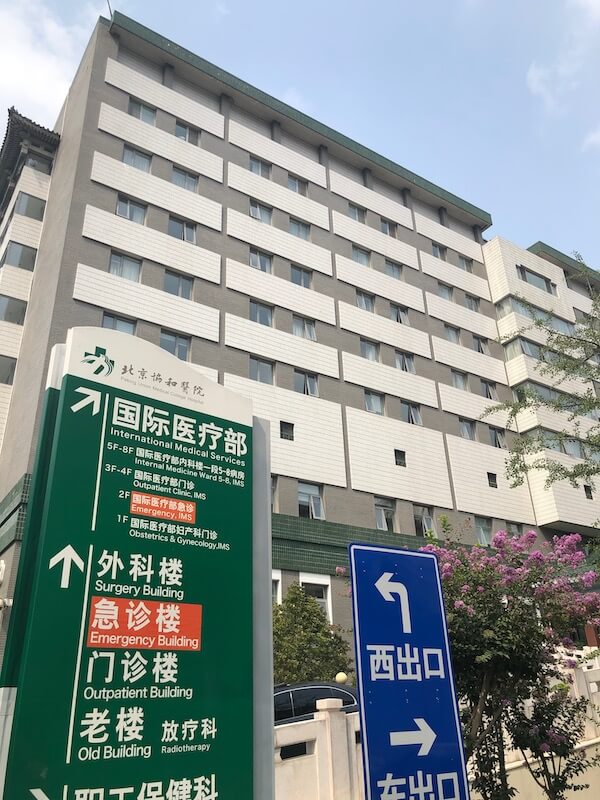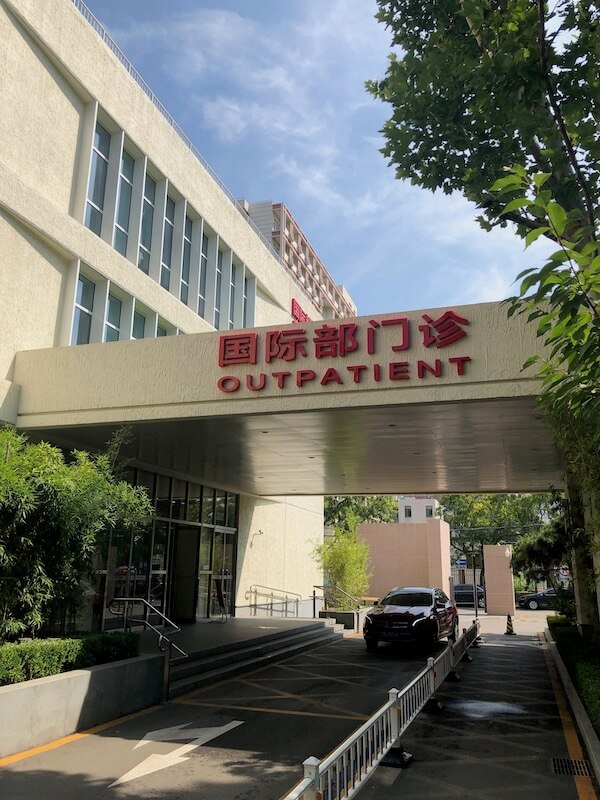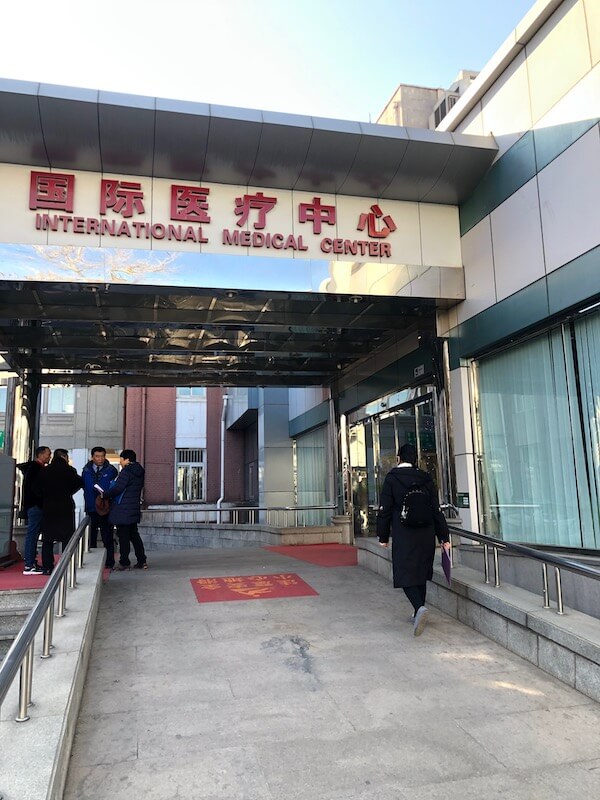A public Beijing hospital can be a good option for your healthcare needs. Especially if you are on a low budget and do not have comprehensive medical insurance.
The quality of care at the state-run hospitals has improved significantly in the last two decades. The convenience of booking doctor appointments has also improved.
Most of the public hospitals in Beijing allow foreigners to use their standard services just like the locals. Some, however, do require expats use their VIP wards, also known as the International Medical department.
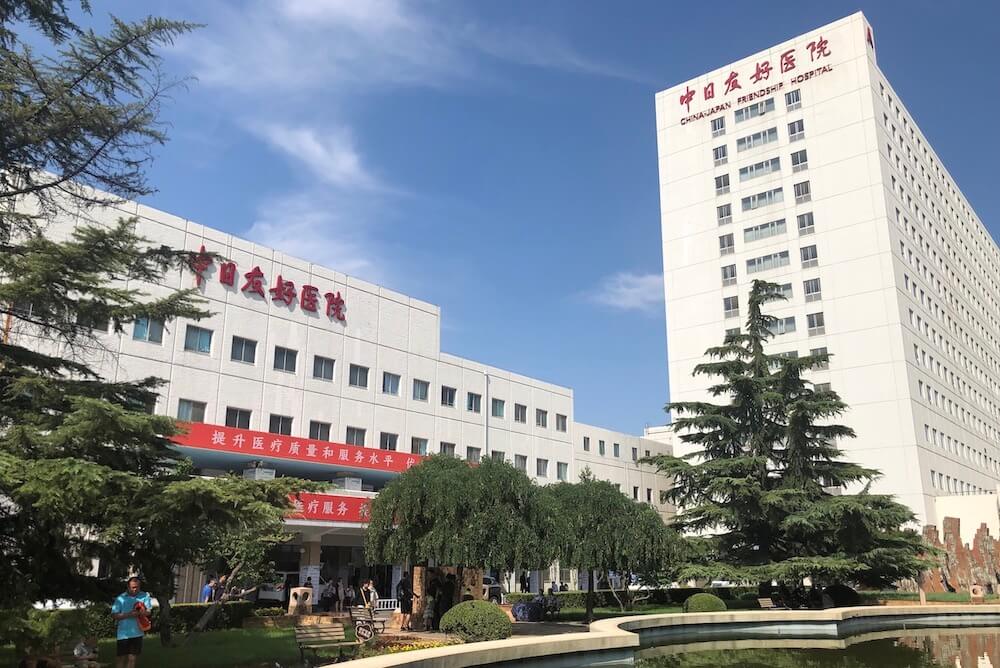
In this article we give you an introduction to a public Beijing hospital, including:
- Public hospitals
- Beijing doctors
- Booking a doctor appointment
- Consultations
- Hospital Fees
- VIP Wards
- Using medical insurance
- Prescriptions
- Hospitalization
- Tips for using a Beijing hospital
At the end, you can find a Beijing hospital list with contact information and mobile apps for several of the top hospitals in Beijing including:
- Chaoyang Hospital
- China-Japan Friendship Hospital – also known as the Sino-Japan Friendship Hospital
- Beijing Friendship Hospital
- Peking Union Medical College Hospital (PUMC) – also known as the XieHe Hospital
These are the public Beijing hospitals most commonly used by foreigners in Beijing. There are, however, several difficulties for foreigners to use a public Beijing hospital, which we examine below.
Expats who have comprehensive medical insurance, or who are willing to pay higher fees for better personal care can choose one of several Beijing international hospitals and clinics for their healthcare needs.
Public Beijing Hospitals
Beijing has several comprehensive hospitals with departments for all your Beijing healthcare needs, including maternity and dental services. There are also specialized hospitals which focus on specific diseases, such as the Beijing Cancer Hospital.
Many of the public Beijing hospitals have Fever Clinics, where you would go to get tested if you have a fever caused by an infectious disease such as COVID-19.
The regular Beijing hospitals follow Western medicine practice, but most also have traditional Chinese medicine (TCM) departments. Even the Western medicine doctors in Beijing hospitals have received some training in TCM theory and will sometimes prescribe TCM medicine to complement Western medicine prescriptions.
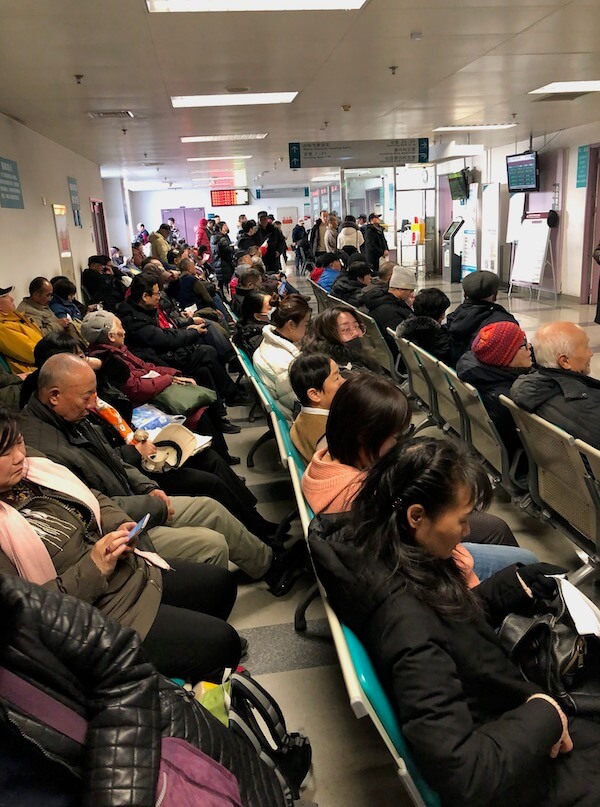
There are also a few specialized TCM hospitals in Beijing. The doctors at these hospitals have received some training in Western medicine practice, but will focus on using traditional Chinese medications and procedures to cure your ailments.
Beijing hospitals offer both inpatient and outpatient care. Although China has recently started to promote the use of clinics and family doctors, most Chinese still prefer to go directly to a hospital for outpatient consultations.
Chinese tend to have more trust in the standard of care and quality of equipment at larger hospitals. Some Chinese will even travel from other cities and towns to seek care at the reputable Beijing hospitals. This results in very crowded hallways and waiting areas.
Most hospitals also have emergency departments that you can visit after the regular operating hours of their outpatient sections.
Beijing Doctors
Doctors at a Beijing hospital are broadly divided into General practitioners (Pǔtōng yīshēng – 普通医生), Department head/Chief doctor (Zhǔrèn yīshēng – 主任医生), and Specialist doctors (Zhuānjiā yīshēng – 专家医生).
General doctors are available everyday in all departments, easier to book and cheaper. Chief Doctors and Specialists might only be available one or two days a week and therefore harder to book, as well as more expensive.
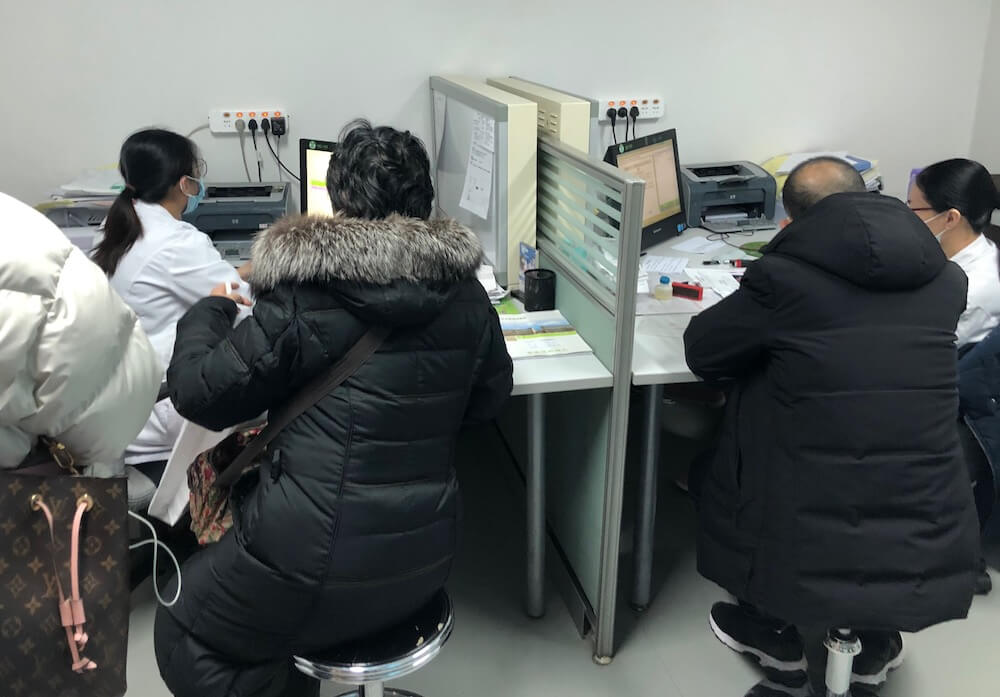
For initial consultations the general doctors are more than adequate. If you have a serious or chronic issue you might want to choose a specialist.
The doctors at Beijing hospitals have been through high-quality residency programs and receive ongoing training to stay up to date with the latest medical procedures, equipment and medicines from around the world.
Beijing doctors see many patients each day and perform numerous medical procedures each year, so they become experienced and skilled very quickly.
Most doctors at Beijing public hospitals can speak a little English, and read and write English medical terms quite well. But they rarely speak English, so are usually not fluent and have poor pronunciation. Other staff that you will need to interact with at the hospital for registering, paying fees, collecting your prescription etc. will have even less English speaking proficiency. So, it is better to go with a Chinese speaking friend if you can’t speak Chinese yourself.
Internal Medicine Department (Nèikē) vs Surgery Department (Wàikē)
Outpatient departments in Chinese hospitals are also separated by Nèikē (内科) and Wàikē (外科) departments.
Nèikē is translated as ‘Internal Medicine’ and is for an ailment that will primarily require drugs to be administered. Doctors working in the Internal medicine departments are called physicians (Nèikē yīshēng – 内科医生).
Wàikē is translated as ‘Surgery’ and is for a health issue that might require surgery or another medical procedure. Doctors working in the Surgery departments are called surgeons (Wàikē yīshēng – 外科医生).
Booking a Doctor Appointment
It can be quite easy to book a doctor’s appointment at a public Beijing hospital, but only if you can read Chinese. There are various Chinese language websites, mobile apps and WeChat official accounts you can use for booking a doctor appointment without the need to visit the hospital first.
If you can’t read Chinese, you will need to find a Chinese friend to help you register an account with one of these apps.
Mobile apps and WeChat accounts for booking a doctor appointment require real-name identification to register. Some allow foreigners in Beijing to register with their passport number. This is a great advantage over Shanghai, where the popular doctor appointment booking site; WeiYi (WeChat ID: weiyi_shiye), requires a Chinese ID number to register. This makes it very inconvenient for a foreigner to book a doctor’s appointment at a public Shanghai hospital.
Mobile Apps for Booking Doctor Appointments
The best doctor appointment booking apps in Beijing are 114 Health, and JingYiTong.
Inside these apps and WeChat official accounts you will find listings for most of the hospitals in Beijing. The listings are further divided into various medical departments under which you can find individual doctors and their available appointment times.
114 Health Doctor Appointment App
App name in Chinese – 114 Jiànkāng (114健康)
Website: https://www.114yygh.com (you can scan the QR-Codes for both the app and WeChat official account here)
WeChat ID: beijing114guahao
I was able to register with my foreign passport for this app and WeChat official account.
The consultation fee is not collected when booking an appointment with this app. Instead, you will make the payment when you arrive at the hospital. You can cancel a booking one day in advance, but if you fail to do so and do not show up for the appointment you might be suspended from this service.
JingYiTong Doctor Appointment App
App name in Chinese – Jīng yī tōng (京医通)
WeChat ID: jingyitong_kefu
I could not register an account directly with my foreign passport for this WeChat official account. But I could register an account using the Beijing medical card that I had obtained when I previously visited the Chaoyang Hospital.
When booking an appointment with this WeChat account you must immediately pay upfront using your WeChat wallet or Alipay wallet. I found that with this app I was sometimes able to book an appointment for the same day or the next day, whereas the 114 app usually only has available bookings for two or more days later.
It is best to have both apps and check them each time. One time I was able to book an appointment at the Beijing Friendship Hospital with the 114 Health app when the JingYiTong app showed the doctors were fully booked. Another time I was able to book an appointment with the JingYiTong app for the next day when there were no available appointments on the 114 Health app.
Some hospitals also have their own apps and WeChat accounts through which you can book appointments. We list some of these in the contact info below.
Booking a Doctor Appointment by Phone or at the Hospital
It is very difficult to book an appointment by phone for a public hospital in China. You can try calling the local Beijing telephone information hotline, 114, but Chinese language skills and patience will be required. Once you have navigated to the correct sub-directory a person will come online to help you book the appointment.
The traditional way to book a doctor appointment in China is to show up at the hospital, go directly to the department you wish to visit with your hospital card and wait in line to book the appointment.
This approach often meant you had to arrive early in the morning to get one of the limited available numbers for that day. During the COVID-19 pandemic, however, most public hospitals in Beijing require you to book an appointment in advance, and do not accept drop-ins.
Booking a doctor’s appointment at a Beijing international hospital by phone in English is much easier.
Beijing Hospital Medical Card
When booking an appointment using the 114 application for the first time, you will be given a temporary Beijing medical card number. When you arrive at the hospital you first need to exchange this temporary number for a permanent Beijing medical card in the main lobby.
Some hospitals in Beijing use the same Beijing Medical card, but there is more than one hospital system in Beijing, so you might have to apply for different medical cards when using different hospitals. The medical card you get at the Chaoyang Hospital is accepted at the Beijing Friendship Hospital, but not at the China-Japan Friendship Hospital.
Doctor Consultation
When arriving at the hospital you should go to the payment counter in the medical department for which you booked an appointment, show your medical card and pay for the appointment. You will receive a number and then wait in the waiting room until your number is shown on the board. When your number is shown you will go to your doctor’s consultation room, but might have to wait outside a little longer while patients in front of you finish their consultations.
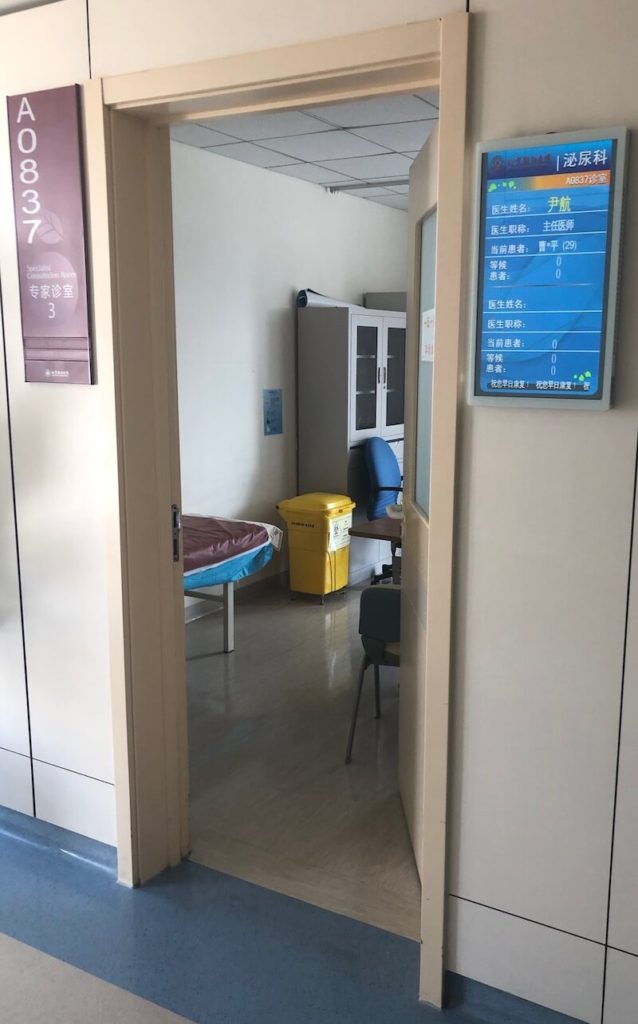
The doctor has to see many patients each day, so do not expect a long consultation time. Most consultations at a Beijing hospital last no more than ten minutes. The doctor will not have time to deeply delve into your medical background. Rather, in most cases they will just ask you the reason for your visit, make some quick health checks and then order blood-work and other tests. They will rely on these test results to make their diagnosis.
Do not expect much privacy during your consultation. General practitioners often share a consultation room with one or more other doctors; all meeting with patients at the same time. Chief Doctors and Specialist doctors usually have their own room, but sometimes keep the door open. They usually close the door during examinations, but don’t be surprised if other visitors enter as you are being examined.
Each time you visit the hospital you are likely to see a different doctor. Although some doctors might check your visitation history and prior test results on a computer, these reports will not be extensive.
International hospitals and clinics provide much better personal care and keep more detailed individual patient records.
Beijing Hospital Fees
Consultation fees at a public Beijing hospital are relatively cheap, although they have increased in recent years.
For common health issues the consultation fee for a general doctor is around RMB 50 (US$ 7.20), and for a specialist about RMB 80 (US$ 11.50). Some departments, however, can charge as much as RMB 500 (US$72) to see a specialist. Prices for various types of doctors are often listed on big billboards in the hospital foyer.
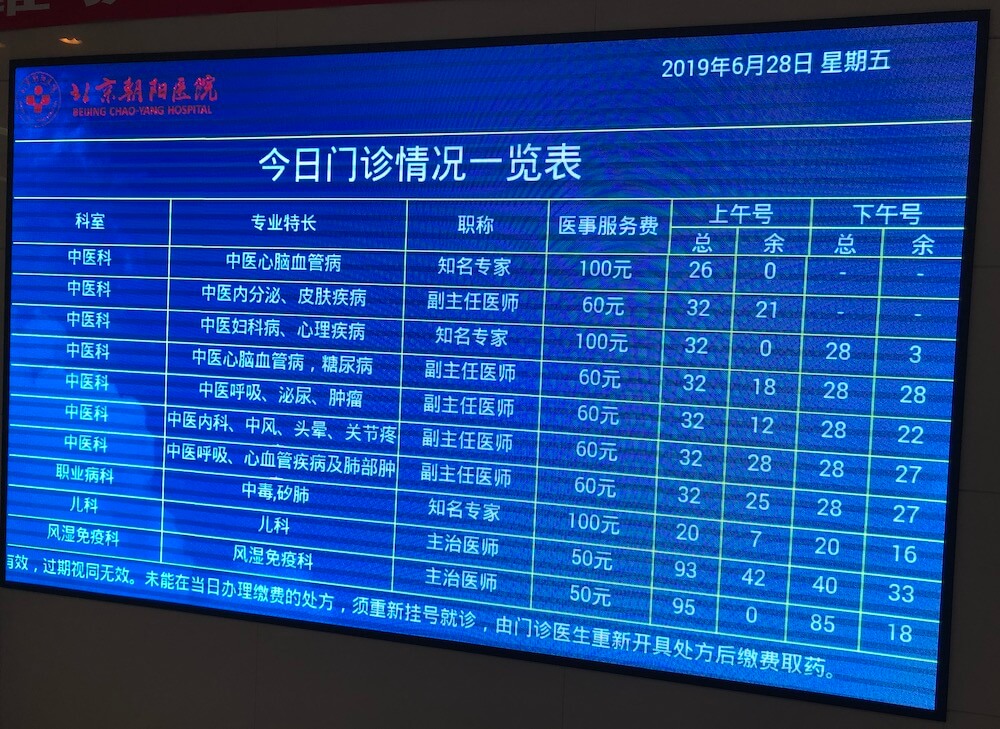
Medical tests and operations conducted in the main section of public hospitals are much cheaper than those in their VIP wards or at an international hospital in China. We list the fees for several kinds of tests and exams in our Beijing hospital reviews article.
Beijing Hospital VIP Ward
Some of the larger public Beijing hospitals have VIP wards, often called the International Medical Center. These were originally established to cater to expats in the 1980’s and 90’s. Nowadays, however, the VIP wards are frequented more by wealthy locals.
The doctors working in VIP wards are mostly local Chinese. They have better English language skills though, helping them communicate with foreign patients. The nurses and administrators in the international section will also have better English language skills. You will receive higher quality personal care and longer consultation times with your doctor in the VIP wards.
Some VIP wards, such as the one in the Chaoyang Hospital (located on the 9th floor), are very small. Such small VIP wards will make use of the facilities in the main section of the hospital. The Chaoyang VIP ward will, however, arrange for your tests and procedures so you don’t need to wait long in the crowded main section of the hospital. They will also arrange someone to escort you to the main section.
The Chaoyang Hospital VIP section does not have its own hospital beds. If you need hospitalization they can only arrange a shared room with 4-8 patients in the main section of the hospital. The advantage of this, however, is that the fee for hospitalization will be a lot lower than that at other VIP wards.
The VIP sections in the China-Japan Friendship Hospital, Beijing Friendship Hospital and Peking Union Medical College Hospital are much larger with their own independent buildings. Here, you will have most of your tests and procedures done without needing to visit the main section of the hospital. You can also request a private room when you need hospitalization in these VIP wards.
It is much easier to book an appointment by phone for the VIP section of public hospitals. Some also have English language apps for booking appointments online.
Foreigners are able to choose between the main section or the VIP section of the Chaoyang Hospital, China-Japan Friendship Hospital and Beijing Friendship Hospital. The PUMC Hospital, however, does not allow foreigners to use its main section; so you can only use their International Medical Services department.
Fees to Use the VIP Ward of a Beijing Hospital
The fees charged by VIP wards in Beijing hospitals are much higher than those in the main section. In fact, their fees are more inline with the fees you would be charged at the international hospitals and clinics in Beijing.
The Chaoyang Hospital VIP ward charges RMB 300 for an initial consultation. The Beijing Friendship hospital charges between RMB 150 and 300. The China Japan Friendship Hospital charges between RMB 200 and 300. The PUMC Hospital charges between RMB 600 (US$ 86) and 1,200 (US$ 172) for a consultation, depending on the type of doctor you wish to visit.
International hospitals and the VIP wards also charge much more for tests and procedures. Fees can be anywhere from 2 to 20 times higher than the price charged in the main section of a public hospital in China.
Medical Insurance
You must pay upfront for all services and medication at a public Beijing hospital. Locals can use their Chinese state social insurance policies, but public hospitals do not accept direct billing from private medical insurance companies.
Many private insurance companies, however, will allow you to reimburse qualified expenses from a Chinese public hospital based upon medical reports and official receipts.
Be sure to check with your insurance provider first to make sure you are qualified for reimbursement when using a Beijing hospital. Find out what services, procedures and medications you are covered for. Also be sure to know what documents and forms you will need to submit for reimbursement before using any medical services in Beijing.
Cheaper medical insurance plans only cover inpatient care; requiring hospitalization. More expensive policies cover outpatient care including consultations and tests.
If you prefer direct billing, the international hospitals in Beijing can arrange it with many different medical insurance providers. But first check to see if your policy will be accepted.
The VIP wards also cooperate with some private medical insurance companies for direct billing. You can visit several of them to find out if they can accept your insurance policy.
Prescriptions
If your doctor gives you a prescription you will first need to go to the payment counter to settle the fees and then go to the pharmacy section of the hospital to hand in your receipt and wait for your number to be called or shown on a big board, before picking up your medicine.
Not all the newest medicines from the West are available in China, but the most common ones usually become available quite quickly, especially at the larger hospitals.
Antibiotics in China require a prescription, so you will need to visit a hospital or clinic to get one before collecting them at the hospital, or buying them at a pharmacy.
Some pharmacies have installed video terminals which the pharmacist can use to call up a doctor. The doctor will interview you on camera and open a prescription if approved.
Hospitalization at a Beijing Hospital
If the doctor decides you need hospitalization, he will give you a form which you will take to a designated registration desk for booking a bed. You will need to pay a deposit upfront to cover any operation, medication and room fees before you are assigned a bed.
You will be given a hospital robe, but you are expected to bring your own personal items such as slippers, tooth brush, soap etc. Most Chinese patients will have relatives visit them daily to bring supplies, which can make the rooms quite noisy during visiting hours.
Most Beijing hospital rooms will have 4 to 8 beds. For a private room you will still need to go to the VIP section of the public hospital, or an international hospital in Beijing.
Beijing hospitals have food service for inpatients with some choice available, but mostly Chinese dishes. Someone will come by your bed everyday to take your order.
The author was surprised several times with how quickly operations could be arranged at a Chinese hospital; often within just a few days of visiting the doctor.
The medical equipment used at the top hospitals in China for complicated surgeries is high quality; often from multi-national manufacturers including Siemens, GE and Philips, or from reputable Chinese manufacturers.
Beijing Hospital Tips
- When booking a consultation you will only have the choice of morning or afternoon. Appointments for tests are sometimes at a more specific time.
- When you arrive at the hospital for the appointment you need to check in (Bàodào – 报道). You then need to carefully watch a notice board to see when your name or number is called.
- Doctors will finish seeing patients at 11:30 for the morning session and 4:30 for the afternoon session.
- It is better to arrive early in the morning or afternoon for your appointment. If a doctor prescribes tests you might be able to get the results and return to the same doctor before the end of the day. You do not need to book a new appointment or wait long in line if you bring the results back to the same doctor on the same day.
- Some tests can be arranged immediately, but sometimes you will need to make an appointment for tests another day. You will then need to book a follow-up appointment for a doctor to go over your test results.
- Most blood and urine tests require 30 minutes to one hour to receive results. Ultra-sound results can be obtained immediately. CT scans require a detailed report which will only be available a few days later.
- The hospital is more crowded in the mornings when many tests are carried out. So if you don’t need a test, or maybe only a blood test, you could choose an afternoon consultation.
- Some tests and scans require an empty stomach. So if you think you might need tests it is better to not eat for several hours before the appointment.
Beijing Hospital List
Chaoyang Hospital
Main Campus
Address: 8 Gongren Tiyuchang Nanlu, Chaoyang District
Western Campus
Address: 5 Jingyuan Road, Shijingshan District
Website:
https://www.bjcyh.com.cn/Html/News/Articles/21569.html
https://www.bjcyh.com.cn/Html/Index.html
WeChat ID:
chaoyangyiyuan
Chaoyang Hospital VIP ward
Location: 9th floor of the Chaoyang Hospital main campus
Tel: 85231481 or 85231653
Chaoyang Hospital Test Center
WeChat ID: gh_4b5950134790
Tel: 89138250, 89138251
China-Japan Friendship Hospital
Address:
Chaoyang North, #2 Yinghuayuan Dongjie (East Street)
Tel: 84206060
Website:
https://www.zryhyy.com.cn
WeChat ID:
zryhhospital
IOS App:
zryh,中日医院
https://apps.apple.com/app/id1299580685
International Department
Appointment Tel: 6422 2952 , 6428-2297, 8420-5071
Beijing Friendship Hospital
Address:
95 Yong’an Road, Xicheng District, Beijing
Website:
http://www.bfh.com.cn/Html/News/Articles/123.html
http://www.bfh.com.cn
WeChat ID:
BFH1952
International Medical Center:
Appointment Hotline: 63137606, 63137607, 63137608
Peking Union Medical College Hospital (PUMCH) (Xiehe Hospital)
Main Campus
1 ShuiFuYuan, Wangfujing, Dong Cheng District
Tel: 6529 6114
Xidan Campus
No.41 Damucang Hutong, Xicheng District
Websites:
https://www.pumch.cn/en.html
https://www.pumch.cn/en/medical_care.html
https://www.pumch.cn/index.html
WeChat ID:
pumch1921
App:
https://apps.apple.com/ca/app/北京协和医院/id999678729
International Medical Services:
Tel: 69156699 (press 2 for English service)
WeChat ID: IMS_PUMCH

